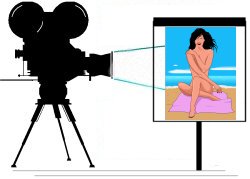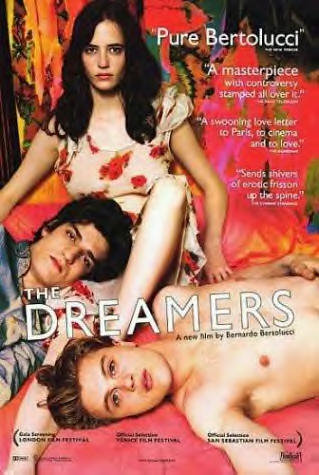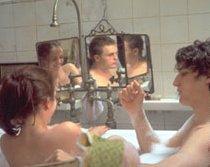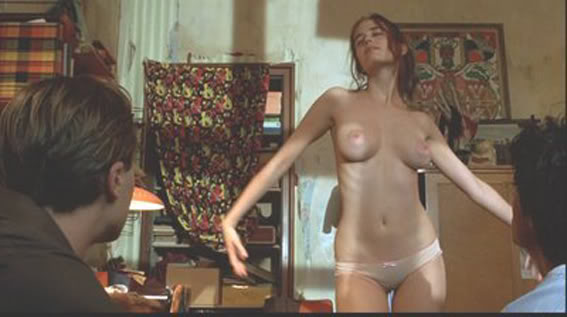 www.socalnaturist.org |

|
The Movie BuffTM:
|

|
Name of Film:
The Dreamers
Our Rating:
Running time 115 minutes (Original), 112 minutes (R-rated cut). Languages: English, French (subtitled)
The Dreamers is a 2003 French/British/Italian drama film directed by Bernardo Bertolucci. The screenplay is by Gilbert Adair, based on his own novel The Holy Innocents. The film was an international co-production by companies from France, Italy, and the United Kingdom. The Dreamers was controversial in the United States for its depiction of nudity and sexual content, which garnered it an NC-17 rating. The primary language spoken in the film is English, though French and English are spoken interchangeably throughout.
The Plot: A young American exchange student, Matthew (Michael Pitt), has come to Paris in order to study French. Though he has lived there for several months and will stay in Paris for a year, he has made no friends. As a huge fan of film, he spends most of his time in the Cinémathèque Française. Eventually he forms a rapid friendship with a Frenchwoman, Isabelle (Eva Green), and her brother, Théo (Louis Garrel). Isabelle and Theo claim to be twins originally conjoined at her right and his left shoulder, although as they are opposite sexes this cannot be possible. However throughout the film, scars on their shoulders can be seen.
All three have an avid love for movies, especially "the classics". As their friendship grows, Matthew learns of the extreme intimacy shared by the siblings (what one reviewer described as "incestuous in all but the most technical sense" and gets pulled into their world.
Over time he falls in love with them, and the three seclude themselves from the world, falling further and further away from reality as they take part in an unethical and highly erotic sexual journey. As a juxoposition, we hear the noise from the 1968 student rebellion rising in the streets outside. The three bathe together, sleep together, and test each other's movie knowledge by acting out favorite scenes in front of each other.
After one particular hedonistic evening, the three fall asleep, nude, and in each others arms. A few hours later the parents of Isabela and Theo arrive back home from their vacation in the South of France, and discover the sleeping trio. Not wishing to wake them, they leave a check to cover their living expenses in a visible place when they leave. When the trio wake and realize their self-made world has been discovered, their relationship unravels and the two siblings leave the apartment to join the student rioters outside, realizing they first have to change the real world before they can live their dream.
|
After its release, most film critics gave the film generally favorable reviews. The web site Rotten Tomatoes, scored it with a 61% "fresh rating." A.O. Scott of The New York Times said the film was "disarmingly sweet and completely enchanting" and a "heady blend of Last Tango in Paris and Stealing Beauty," also directed by Bertolucci.
Fox Searchlight initially released an uncut, unrated version in 2004 to about 100 theaters in the United States. This version was withdrawn a few weeks later and replaced by a newly-edited version with an NC-17 rating. (By comparison, the uncut version when released in Italy later that year, was approved for those over age 14.) As an NC-17 rated movie, the film was refused advertising or promotion in most of the newspapers across the country. As a result, the filmmakers had to rely on word of mouth to spread the word. Ultimately, the film grossed only $2.5 million in the United States, about $15 worldwide, which covered its costs but not much else. Fox Searchlight's released the NC-17 DVD in early 2005 -- with the original uncut scenes among the bonus material.
The way the MPAA, the distributors, the newspapers, and the general public responded to this film once again refocused our attention on the issue of full frontal sexuality by both male and female actors in movies, and just "how far" was "appropriate" for the sake of "art."
To be completely vulnerable on the screen and let one's body be exposed to such intimate details is courageous, to say the least, but to pull it off with exceptional acting is brilliant! The relationship between the three main characters is very voyeuristic, and the director puts his three leads through some incredibly intimate moments. Which may have been his point, to again push the boundaries of what is permitted on screen to properly tell a story.
It is said when Eva Green saw a rough cut of the film, she said she was "quite shocked" and had to look away during the sex scenes; she later told an interviewer that for her, "it was as though I was wearing a costume while we were making the film. It was as if I had another story in my mind. So I was left speechless."
Since his
The instances of actors in mainstream American movies swinging in the breeze are still very rare: Harvey Keitel has let it all hang out at least twice ("The Piano" and "Bad Lieutenant"); Bruce Willis in 1994's "Color of Night;" Kevin Bacon in 1998's "Wild Things"; and Geoffrey Rush in 2000's "Quills." And then there was the prosthetically-enhanced Mark Wahlberg in 1997's "Boogie Nights." But few others. Meanwhile practically every major female star in America (Julia Roberts and Renee Zellwegger the very vocal exeptions) have at least flashed us a fleeting breast.
When NC-17 supplanted "X" -- mostly because it had been proudly commandeered by the porn industry -- it retained a smutty stigma. Time was, even an X rating wasn't a drawback: John Schlesinger's "Midnight Cowboy" won the 1969 best-picture Oscar despite it.
At the time of its release Bertolucci was quoted as hoping The Dreamers might be the watershed that re-opened the ability for major studios to take a chance on more adult fare and not be afraid of the NC-17 rating. Unfortunately, the weak box office of this film confirmed that the disasterous response to Showgirls (1995) was not a fluke. Alas, the American public is just not ready to grow up.
Review by Gary Mussell, SCNA Film Critic
Email Us Your Comments About This Review

